'We didn't see it as treason': The Russian couple who became informants for Ukraine
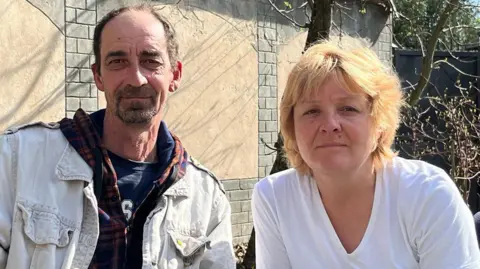 BBC
BBCIt was shortly after Moscow annexed Crimea from Ukraine in 2014 that Sergei and Tatyana Voronkov decided they would leave Russia.
The couple, who had long been critical of Vladimir Putin, had condemned the actions of Russia to friends and acquaintances. In response, they were told that if they didn't like it they could leave.
So the couple, both Russian citizens, decided to relocate to Ukraine, where Tatyana was born.
In 2019 they eventually settled in Novolyubymivka, a village of about 300 people in the south-eastern Zaporizhzhia region.
The couple got four dogs and started raising livestock, while Sergei, 55, also found work as a land surveyor – his specialism during his time in the Soviet army.
They hoped for a quiet life. But when Moscow launched its full scale invasion of Ukraine in February 2022, the peace of their new lives was shattered by the first Russian rockets flying over their home.
"I heard something whistling, something flying, and I went outside," Tatyana, 52, recalls.
"A rocket was flying right over the house.
"I went on the internet to see what had happened and they wrote that Kyiv had already been bombed."
The couple quickly found themselves in occupied territory, and decided to become informants for Ukraine.
What followed was detention, interrogation, an escape into Europe – and a letter of thanks from the Ukrainian army.
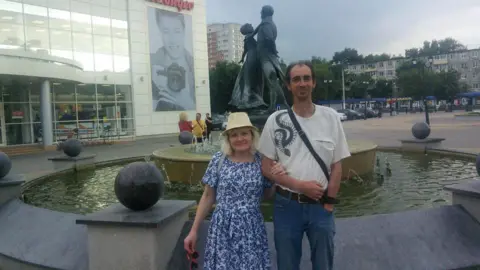 FAMILY ARCHIVE
FAMILY ARCHIVEIt was when a Russian convoy passed their home for the first time that Tatyana decided to act.
She ran inside and messaged an acquaintance in Kyiv, whom she believed had contacts in Ukraine's security services.
The contact sent her a link to a chatbot on messaging app Telegram which told her they would be contacted by a person with a unique identifier.
The couple were then asked to provide the location and details of Russian electronic warfare systems and military hardware they had seen, particularly missile systems and tanks.
The locations would help the Ukrainian army target and destroy Russian troops in the area with drones and artillery.
"We didn't think of it as treason," says Tatyana, who along with Sergei insists the information they gave did not result in any strikes on civilians or civilian infrastructure.
"Nobody attacked Russia. This was a fight against evil."
For two years, Sergei would collect coordinates and Tatyana would transmit them from her phone - removing all traces of the messages afterwards - as and when their village's internet access allowed them to do so.
But all of this came to an end when Sergei was detained in April 2024 by armed men while he was shopping for gardening seeds in the regional centre of Tokmak.
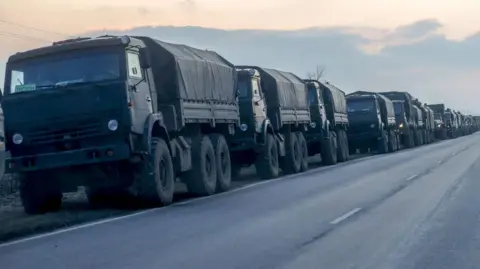 Anadolu Agency via Getty Images
Anadolu Agency via Getty ImagesInterrogated in a pit
Sergei says he was taken to an abandoned house and put in a cold basement pit - around two metres wide and three metres deep - where he slept in a squatting position.
The next day he was questioned about whether he had passed details of Russian positions to the Ukrainians. Sergei says a bag was kept over his head during the interrogation and he was threatened with violence.
After initially denying his involvement, Sergei confessed on the fourth day of his captivity, fearing that if he were subjected to violence he might accidently implicate others.
While all of this was happening, Tatyana was desperately searching for information on his whereabouts.
She travelled the area and phoned hospitals and morgues, while the couple's son, who was still living near Moscow, contacted various authorities there.
Ten days after Sergei's arrest, security forces searched the Voronkovs' home and dug up $4,400 that had been hidden by the couple in their garden.
Shortly after, Tatyana was told that her husband was "sitting in a basement" and was with Russia's security services, the FSB.
Weeks later, after 37 days in captivity, Sergei was made to confess to assisting Ukraine on camera by people who introduced themselves to him as FSB.
But to his surprise, he was released two days later, though almost all of his documents, including his passport, were confiscated.
To this day, Sergei and Tatyana do not understand why he was released.
However, the BBC understands this is not uncommon in parts of Ukraine occupied by Russia, where investigative and judicial processes lack transparency and often no explanations are given as to why a person is detained or released.
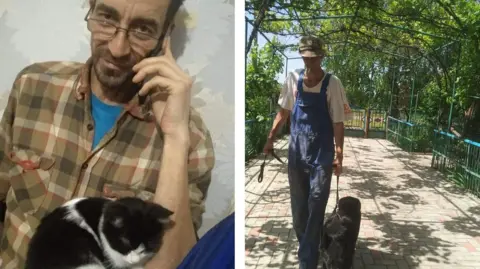 FAMILY ARCHIVE
FAMILY ARCHIVEIn the weeks after Sergei's release, the couple believe they were kept under surveillance, with cars constantly driving up to their home and strangers asking them if they were selling anything.
Believing they'd never be left alone, the couple began plotting a way to leave.
After consulting human rights activists, Sergei and Tatyana decided to try to travel to Lithuania. But to do that, they needed to return to Russia first to get Sergei a new passport.
Their neighbours in Novolyubymivka helped by buying livestock and household appliances from them. The couple even managed to find a new home for their dogs, which Sergei says was his biggest worry.
Escape with a rubber ring
The couple set off in their car.
Fearing they could be pulled over and quizzed by Russian forces, they made up a cover story about going to the beach to get fresh air for Tatyana, who has asthma. They even brought a straw hat and a rubber ring to make the story more convincing.
But in the end they weren't stopped.
The couple were initially denied entry into Russia, but were eventually able to enter after Sergei got a certificate proving he had applied for a new passport.
After delays in getting his passport and a thwarted attempt to leave Russia via Belarus, Sergei bought a fake passport through Telegram.
The couple were then able to travel by bus to Belarus and cross the border using Sergei's forged document. From there, they crossed into Lithuania, a member of the European Union and a close ally of Ukraine, though Sergei was detained for holding forged documents.
He was later found guilty of using a fake passport by a Lithuanian court.
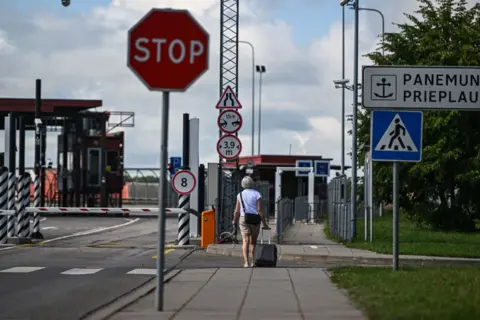 Anadolu Agency via Getty Images
Anadolu Agency via Getty ImagesThe couple are now living in a shelter for asylum seekers and hope to settle in Lithuania.
The Ukrainian army sent them a letter of thanks - at the request of their former handler in Kyiv - to support their application for asylum. The BBC has seen a copy of the letter.
The BBC has also seen documents from official bodies in both Russia and Ukraine that confirm what happened to the Voronkovs. We are not reproducing them to protect the identities of those involved.
The Voronkovs' actions have caused deep rifts in the family.
Their son, who remains in Russia, stopped talking to his parents after learning what they had done. Sergei's mother, who is 87, still lives in Russia and is supportive of the war and President Putin.
But despite this, the couple are adamant they will never return to Russia.
"Only if it starts showing some humanity," Sergei says.
"For now, I see nothing human there."
